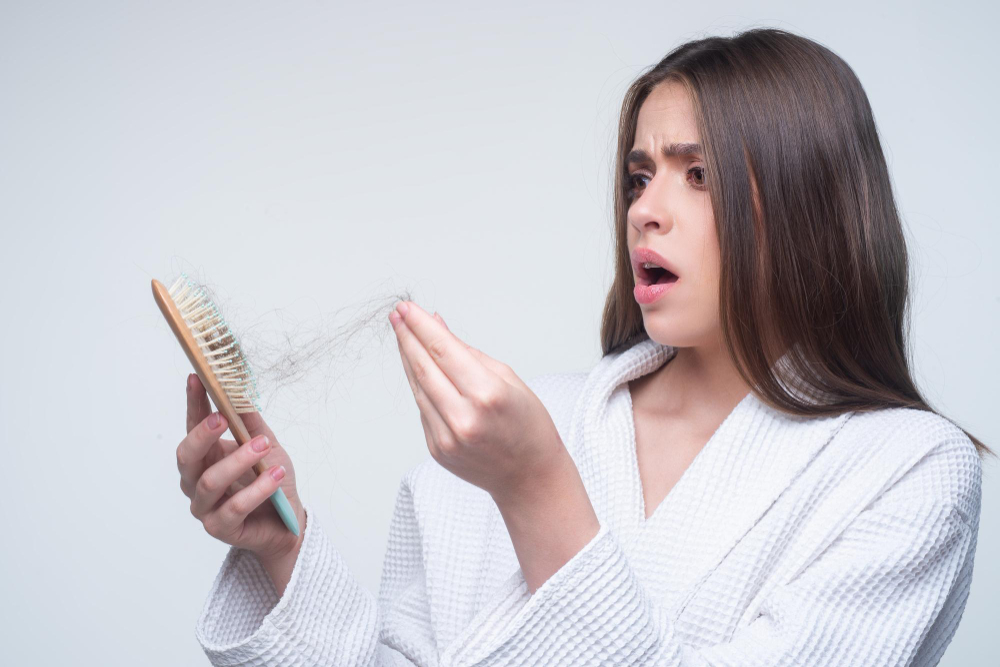
Hair fall can be a distressing experience, impacting both appearance and self-esteem. However, understanding the underlying causes and implementing effective strategies can significantly reduce hair loss and promote healthy hair growth. As a seasoned content writer and a medical professional, I present a detailed guide on how to avoid hair fall and maintain luscious locks.
Understanding Hair Fall
Hair fall, or alopecia, can be attributed to various factors, including genetics, hormonal changes, nutritional deficiencies, stress, and improper hair care practices. It’s normal to lose about 50-100 hairs per day, but excessive shedding can be a cause for concern.
Identifying the Causes
- Genetics: Hereditary hair loss, or androgenetic alopecia, is the most common cause of hair fall in both men and women.
- Hormonal Imbalances: Conditions such as thyroid disorders, polycystic ovary syndrome (PCOS), and menopause can disrupt hormone levels, leading to hair loss.
- Nutritional Deficiencies: Lack of essential nutrients like iron, zinc, biotin, and vitamins can weaken hair follicles.
- Stress: Physical or emotional stress can trigger telogen effluvium, a condition where hair prematurely enters the shedding phase.
- Improper Hair Care: Overuse of styling tools, chemical treatments, and harsh hair products can damage hair and lead to breakage.
Effective Strategies to Prevent Hair Fall
1. Healthy Diet
A balanced diet rich in vitamins and minerals is crucial for hair health. Incorporate the following nutrients to promote strong, healthy hair:
- Protein: Hair is primarily made of keratin, a protein. Include lean meats, fish, eggs, beans, and nuts in your diet.
- Iron: Essential for hair growth, found in spinach, lentils, red meat, and fortified cereals.
- Omega-3 Fatty Acids: Promote scalp health, found in fatty fish, flaxseeds, and walnuts.
- Vitamins A, C, D, and E: Support various aspects of hair health. Include fruits, vegetables, dairy, and nuts in your diet.
2. Proper Hair Care
Gentle hair care practices can prevent unnecessary hair fall:
- Avoid Over-Washing: Washing hair too frequently can strip it of natural oils. Aim for 2-3 times a week.
- Use Mild Shampoo: Opt for sulfate-free shampoos that are gentle on the scalp and hair.
- Condition Regularly: Use a conditioner to keep hair hydrated and manageable.
- Limit Heat Styling: Minimize the use of blow dryers, curling irons, and straighteners. When used, apply a heat protectant.
- Be Gentle: Avoid brushing wet hair, and use a wide-toothed comb to detangle gently.
3. Scalp Care
A healthy scalp is the foundation for healthy hair growth:
- Massage: Regular scalp massages improve blood circulation, stimulating hair follicles.
- Keep It Clean: Wash your scalp thoroughly to remove buildup and prevent dandruff.
- Essential Oils: Oils like rosemary, peppermint, and tea tree can promote hair growth and reduce dandruff when massaged into the scalp.
4. Lifestyle Modifications
Making certain lifestyle changes can positively impact hair health:
- Manage Stress: Practice stress-reducing techniques such as yoga, meditation, and deep breathing exercises.
- Regular Exercise: Physical activity improves overall circulation, including to the scalp.
- Adequate Sleep: Ensure 7-9 hours of sleep per night to allow the body to repair and regenerate, including hair follicles.
5. Medical Interventions
If hair fall persists despite home remedies, consider consulting a healthcare provider for professional treatments:
- Medications: Over-the-counter or prescription treatments like minoxidil and finasteride can be effective for some types of hair loss.
- Supplements: Biotin, iron, and other supplements may be recommended if deficiencies are identified.
- Procedures: In severe cases, procedures like PRP (platelet-rich plasma) therapy, hair transplants, or laser therapy might be considered.
Conclusion
Preventing hair fall involves a combination of good nutrition, proper hair care, stress management, and, when necessary, medical intervention. By understanding the root causes and implementing these strategies, you can maintain healthy, strong hair and reduce the risk of excessive hair fall. Remember, consistency is key—beautiful hair is a reflection of overall health and well-being.
tusharparnami.ctd
Facebook
Pinterest
Twitter
LinkedIn
